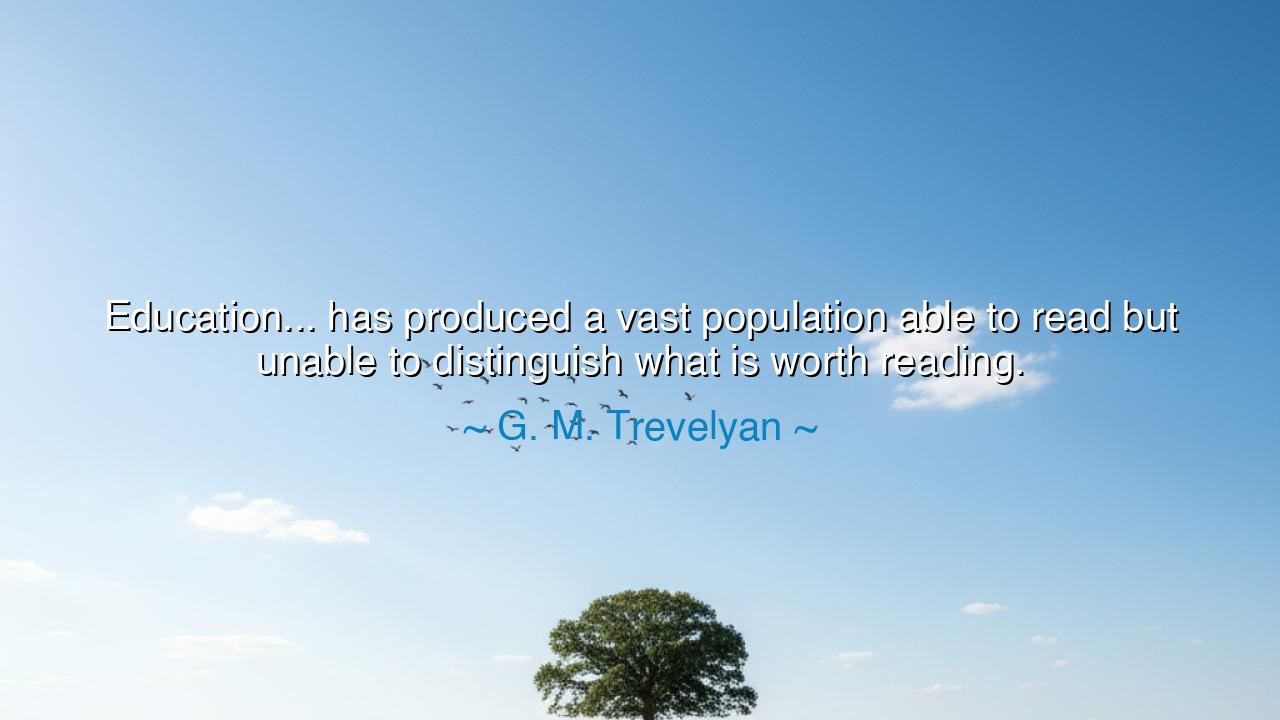
Education... has produced a vast population able to read but
Education... has produced a vast population able to read but unable to distinguish what is worth reading.






There is sharp truth and enduring warning in the words of G. M. Trevelyan, when he declared: “Education... has produced a vast population able to read but unable to distinguish what is worth reading.” In this single sentence, Trevelyan lays bare one of the deepest crises of civilization — the confusion between literacy and wisdom. He reminds us that education, when stripped of discernment, becomes a hollow triumph. It can fill the mind without nourishing the soul. To read is a mechanical act; to understand is a moral one. The true measure of learning is not the number of books one can consume, but the ability to recognize truth amid illusion, beauty amid noise, and wisdom amid vanity.
George Macaulay Trevelyan, an English historian of the early twentieth century, lived in an age when the printed word had become widespread, when public education had reached the masses, and when knowledge seemed more accessible than ever. Yet he saw a danger lurking beneath this triumph — that the power to read without the wisdom to judge could lead to a society more easily swayed by falsehood than guided by truth. His concern was prophetic, for in his time the press was already shaping public opinion, mixing information with propaganda, and turning reading from reflection into distraction. His words now ring louder in our modern world, where voices are many but vision is scarce.
Trevelyan’s insight rests upon an ancient truth: that knowledge is only as pure as the purpose that wields it. To read without discernment is to walk through a forest blindfolded — one may touch a thousand trees and yet never see the path. The untrained reader, though armed with the tools of literacy, becomes a vessel for others’ thoughts, drifting wherever the current of popular opinion takes them. The wise reader, however, is like a sailor who knows the stars — he navigates the ocean of words with understanding, choosing the winds that carry him toward truth. Thus, the goal of education is not merely to teach reading, but to cultivate judgment, taste, and moral clarity.
History has shown the peril of nations that lost this distinction. In the early twentieth century, Germany, one of the most educated societies in the world, fell under the spell of poisonous propaganda. The people could read — indeed, they read the newspapers, the slogans, the speeches — but they could not distinguish what was worth reading. Their literacy became a weapon against themselves, for their minds were open but their discernment was asleep. Trevelyan’s warning was not meant only for scholars; it was a plea to all humanity: that knowledge without wisdom is not progress, but peril.
The same truth can be seen in every age. Even in ancient Athens, Socrates warned against sophistry — the clever use of language without regard for truth. He saw that those who could speak or write persuasively often led the ignorant astray. The problem, Socrates said, was not the abundance of words, but the poverty of reflection. This is what Trevelyan echoes centuries later: that an educated mind is not one that merely reads, but one that chooses carefully, seeking not comfort but understanding. For to read only what pleases the mind is to remain in ignorance; but to read what challenges the heart is to grow in wisdom.
To the wise, Trevelyan’s words are both caution and calling. The abundance of books, voices, and ideas is not the blessing it appears to be if it leads to confusion rather than enlightenment. One must learn not only to absorb, but to discern — to ask of every page: Is this true? Is it noble? Does it awaken the better part of me? This is the sacred task of education: to train the mind to separate gold from dross, truth from deceit, wisdom from wit. For reading without purpose is like eating without nourishment — it fills the body but starves the soul.
Let this then be the lesson: Seek quality over quantity. Read not for distraction, but for transformation. Choose works that lift your understanding, that temper your spirit, that awaken conscience and compassion. Guard your mind as you would guard a temple — for the words you let inside will shape the world you see. As Trevelyan teaches, the power of education lies not in creating readers, but in creating thinkers — men and women who can distinguish light from shadow and hold fast to truth even when falsehood shines more brightly.
Thus, his quote stands as both warning and wisdom for all generations: to read is human, but to discern is divine. The unwise drown in words; the wise find pearls within them. Let every student, every seeker, every soul remember this — that the truest education is not the learning of facts, but the awakening of judgment. And when that judgment is alive, every page becomes a teacher, every word a doorway to the infinite.






AAdministratorAdministrator
Welcome, honored guests. Please leave a comment, we will respond soon